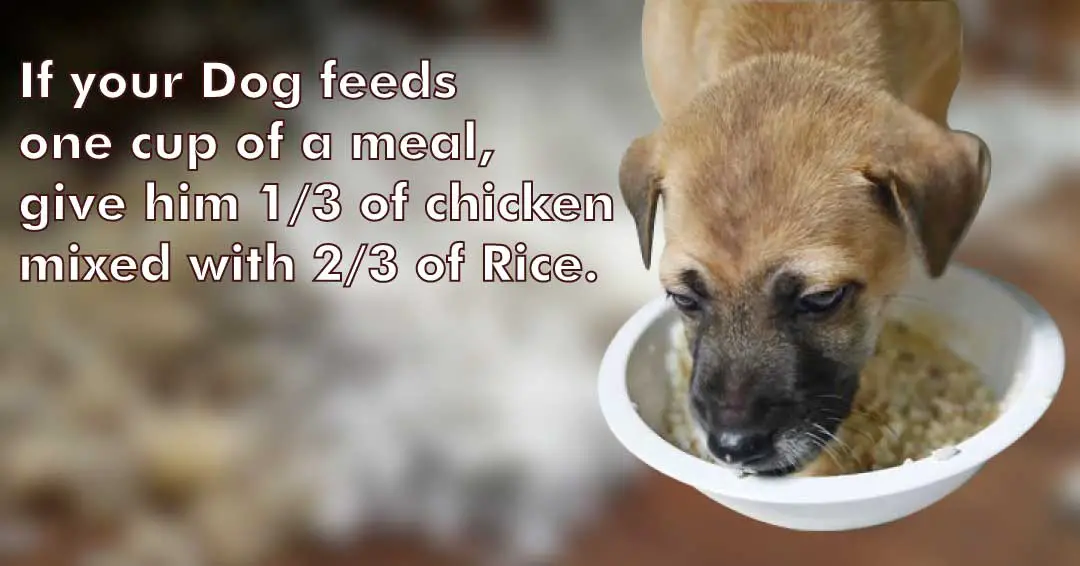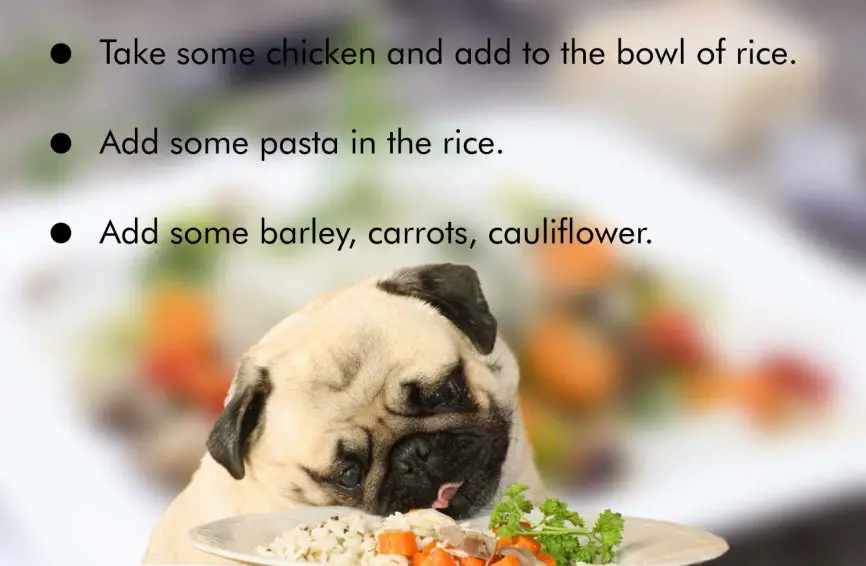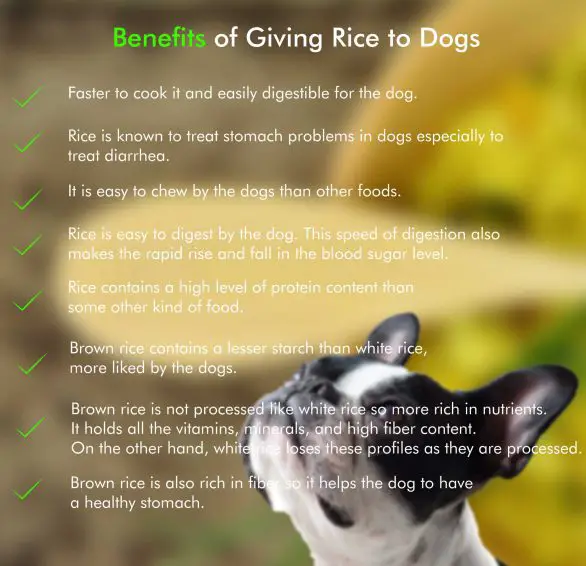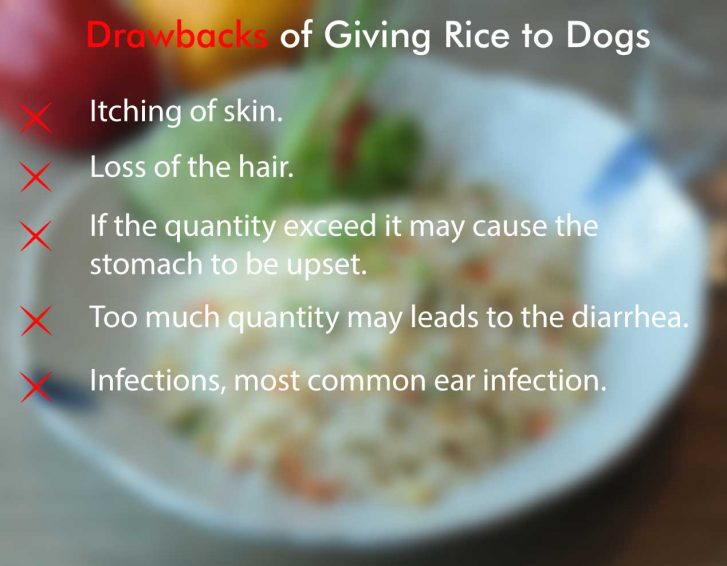Isn’t it adorable when your dog is all doe eyes and asking for a bite of your food? Who can resist them when they are so cute? One of pet owners’ most common questions is: Can dogs eat rice? And we are here to enlighten you on this matter.
Rice is an easily digestible food and a popular energy source for most. But the question remains: Is rice safe for puppies, and can they digest it easily? The short answer to that is Yes! However, white rice is preferable for dogs to brown rice.
Rice is also found in many good-quality dog foods, and it is known to aid common gastrointestinal issues in our beloved dogs!
Can dogs eat rice?
Because rice is a major energy source for millions of people, it is a source of digestible carbohydrates, minerals, and vitamins.
Brown rice is rich in protein, fiber, and less starch than white rice. Brown rice is richer in vitamins and minerals than white rice because it is not processed like white rice. Brown rice can help with constipation.
On the other hand, white rice is more effectively chewable; white rice takes less time to cook and is also budget-friendly.
Rice is good for dogs’ health, especially those suffering from stomach problems. Rice is easily digestible by dogs.
How much quantity of Rice is good for dogs?
Excess of everything is bad. So, serving a diet in the required amount would be best because moderation is key.

This quantity of rice will be enough for the dog’s good health. Also, feed some other small meals along with larger kinds of meals. It would be 10 percent of the total calories of your dog’s food.
How should we prepare Rice for dogs?
To prepare the rice, follow a certain recipe so your dog will eat rice as a treat.
To prepare rice for the dog, you need the following ingredients:
- One cup of rice
- Four cups of water.
- Chicken cubes
Rinse the rice to remove excess starch from the uncooked rice. To do this, put your rice in a sifter and place it under the running tap. Wash until the rice is cleaned thoroughly, put it in a pot, and boil it on the stove for 20 to 30 minutes.
Avoid using butter, cooking oil, salt, or spice because it can cause the dog’s stomach to be upset. When it is done, keep it aside to cool down before giving it to your dog. Add some chicken to it and serve it to your dog.
How to serve Rice to your dog?
Serving is an art, and not everyone is aware of it. It enhances its beauty, and the food looks yummier.

Is Rice bad for dogs?
Rice will not hurt the puppy until it is present in a balanced meal. If the rice is fed longer with no other ingredients, the dog will face a calcium, phosphorous, iron, and protein deficiency.
You can feed a specific dog food with this meal.
Rice is good for a dog’s health if the balance is maintained. Too much quantity of rice will lead to upset the stomach of your dog. If your dog feels discomfort, contact your veterinarian.
Is Rice good for dogs every day?
Our canine companions need less starch and more protein. Rice is rich in carbohydrates, but do not overload your dog with many carbohydrates.
If your dog is healthy, adding some rice to your dog’s meal will not affect his health. Adding rice daily to your dog’s diet will damage their health and upset their stomach.
Is your dog more agile? If yes, then you should feed a specific meal to him daily.
Can dogs eat Brown Rice?
Commercial dog food contains brown rice and other grains to make the meal healthier. Brown rice is nutritious for dogs. It can be given to the dog, but feed it sparingly because too much quantity will upset the dog’s stomach.
Do not give your dog brown rice if he has gastrointestinal issues.
Brown rice is hard to digest because it is not processed like white rice. Brown rice seeds are coated and contain many nutrients. They contain a rich amount of carbohydrates, along with protein and fat.
Can dogs eat Basmati Rice?
It completely depends upon the breed of your dog. Before giving any diet to your dog, you must know his breed.
Dogs of some breeds don’t like the food that is cooked. You must know what kind of food your dog is more comfortable with.
Dogs can eat basmati rice twice or thrice a week. If the dog is suffering from stomach problems, feeding your dog basmati rice and some boiled meat is a very good meal. Basmati rice is not as rich in the glycemic index as plain rice.
Can dogs eat Red Rice?
Red rice is rich in the following nutrients
- Thiamine (vitamin B1),
- Riboflavin (vitamin B2)
- Fiber
- Iron
- Calcium
Red rice tastes sweet and nutty, and the texture is chewy. It takes less time to cook red rice than white rice but does not take as much time as brown rice.
Benefits of Red Rice
It contains more magnesium.
One cup of red rice contains 84 mg of magnesium, and the same amount of white rice contains 19 mg of magnesium.
Prevent constipation.
It has a high fiber content, so it helps prevent constipation. It also facilitates digestion.
It is suitable for the diet.
High fiber content makes your dog feel full and not hungry for longer.
Rich in amino acid and GABA.
Brown rice soaked in warm water before cooking helps stimulate the activation of various enzymes; more amino acid content will be obtained, including GABA (gamma-aminobutyric acid), which is known to increase growth hormones.
Can dogs eat Jasmine Rice?
Jasmine rice has a delicate floral and buttery scent. It contains more fiber nutrients and beneficial plant compounds. Jasmine rice is similar to other long-grain rice, but it differs only in a way that it gets softer and stickier once cooked.
Jasmine rice can only be given to dogs if your dog is not allergic to it.
Jasmine rice contains more calories, iron, fats, and carbohydrates. Red, purple, and black varieties of whole-grain jasmine rice contain essential phytonutrients. It has a slightly sticky nature and fluffiness and an excellent cooking quality.
Jasmine rice, also known as Thai fragrant rice, has a pleasant popcorn-like smell. This smell is due to the molecules called two acetyl and one pyrroline.
Can dogs eat Wild Rice?
Yes, Dogs can eat wild rice. It gives proper nutrition to your dog, ensures your dog’s health, and prevents them from diseases.
Wild rice is a special type of grain. It is chewy and tasty. It is rich in protein than the other rice. It also contains several important nutrients and a high amount of antioxidants.
Wild rice improves health, especially heart health. It also lowers the risk of type 2 diabetes. Wild rice is the best option if you are looking for food that is less in calories and rich in protein. It contains fewer calories and gives double the protein content of brown rice.
It is rich in dietary fiber and other nutrients and helps to lose weight. It is rich in phosphorus, reducing the risk of stress and fractures and increasing bone mass.
Pros and Cons of giving Rice to dogs?
Pros
Both white rice and brown rice are good for a dog’s health. Here, we discuss some advantages of giving rice to your dog.

Cons
You must know that your dog is not allergic to rice (any color or kind). Along with the advantages, there are some disadvantages to giving rice to the dog.
If your dog is allergic to rice, rice consumption can show some symptoms, including.

Conclusion
I want to conclude the discussion about whether dogs can eat rice. Yes, dogs can eat rice, but only if given in a required quantity.
Rice is full of nutrients. Cook the rice properly before giving it to your dog; otherwise, it will upset the dog’s health, especially the stomach. If you feel your dog is uncomfortable after eating the rice or he is allergic to it, contact a veterinarian.

